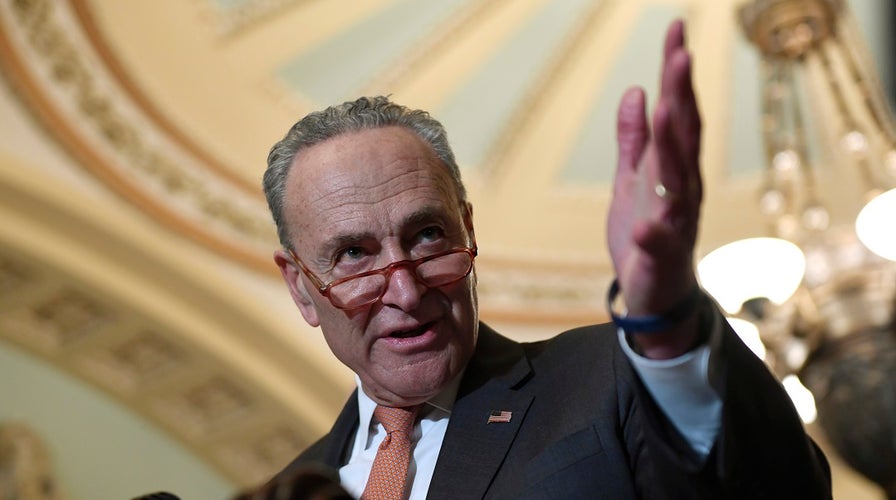Fox News Flash top headlines for July 7
Fox News Flash top headlines are here. Check out what's clicking on FoxNews.com.
Senate Minority Leader Chuck Schumer, D-N.Y., predicted on Wednesday that President Trump will not veto a must-pass bill to fund the military for fiscal year 2021 if it includes an amendment to rename military bases named after Confederate leaders, despite Trump’s threat to do so.
“Let me predict that President Trump will not veto a bill that contains pay raises for our troops and crucial support for our military,” Schumer said, during a speech on the Senate floor. “This is nothing but the typical bluster from President Trump.”
Schumer's prediction came a day after the president tweeted out a threat to veto the National Defense Authorization Act (NDAA) if it included an amendment from Sen. Elizabeth Warren, D-Mass., to rename at least 10 military installations, including Fort Hood in Texas, Fort Benning in Georgia and Fort Bragg in North Carolina.
"I will Veto the Defense Authorization Bill if the Elizabeth 'Pocahontas' Warren (of all people!) Amendment, which will lead to the renaming (plus other bad things!) of Fort Bragg, Fort Robert E. Lee, and many other Military Bases from which we won Two World Wars, is in the Bill!" Trump tweeted Tuesday.
Sen. Jim Inhofe, R-Okla., said after a GOP lunch Wednesday that the president would not veto the legislation, before clarifying that Trump would not veto the NDAA because the Senate wouldn't give him a reason to.
"He's not going to veto it," Inhofe told reporters. "We have a long time to talk about this. It will probably be November by the time it would be coming to his desk anyway, so a lot can happen between now and then, and one thing that isn't going to happen is a veto."
The senator later added: "His threat is a veto threat. It's not an empty threat, but he won't have a reason for doing it if we do our job and we develop the bill the way it should be developed and it will happen."
Inhofe would not commit to saying that meant the Warren amendment wouldn't make it in the bill. "I'm just saying that hopefully he won't have a reason to veto it," the Oklahoma Republican said.
Warren on Tuesday gave a floor speech on the matter, and the GOP-led Senate Armed Services Committee earlier this month approved the measure's inclusion in the NDAA.
TRUMP THREATENS VETO OF DEFENSE BILL OVER AMENDMENT RENAMING BASES THAT HONOR CONFEDERATES
Previous efforts to rename bases have stalled on the grounds that those names are part of tradition. But Warren in her speech Tuesday said the country could not continue to allow its military installations to honor "traitors" to the United States.
"The defense bill we are debating today takes an important step in this direction by addressing the honors that our nation continues to bestow on Confederate officers who took up arms against the United States in the defense of chattel slavery," she said. "This bill denies those honors to military leaders who killed U.S. soldiers in defense of the idea that black people are not people, but instead are property to be bought and sold."
Warren added: "Those who complain that removing the names of traitors from these bases ignores history ought to learn some history themselves. These bases were not named in the years following the Civil War. No. They were named decades and decades later, during the Jim Crow era, to strengthen a movement that tried to glorify the Confederacy and reinforce white supremacy."
The language of the bill would not just rename bases, but ensure that the Confederacy is not honored anywhere, in any form, by the U.S. military.
"Not later than three years after the date of the enactment of this Act, the Secretary of Defense shall implement the plan submitted by the commission ... and remove all names, symbols, displays, monuments, and paraphernalia that honor or commemorate the Confederate States of America... or any person who served voluntarily with the Confederate States of America from all assets of the Department of Defense," the bill reads.
MCCONNELL SAYS HE'S 'OK' WITH RENAMING US MILITARY INSTALLATIONS NAMED FOR CONFEDERATES
Warren's amendment is more sweeping than one proposed by Sens. Tom Cotton, R-Ark., and Thom Tillis, R-N.C., which would commission a study on the issue before allowing Congress and the Defense Secretary to choose whether or not to rename specific assets. Cotton called Warren's amendment "too broad" and said the government should "carefully study each property" before allowing legislators to decide what happens on a case-by-case basis.
If Senate Republicans – at least some of whom backed the removal of the Confederate tributes in order to advance the package through the Armed Services Committee – refuse to back down on the provision, it could set up an intra-party game of chicken with military funding during an election year.
The White House has repeatedly said changing the names of military bases was a nonstarter.
“These Monumental and very Powerful Bases have become part of a Great American Heritage, and a history of Winning, Victory, and Freedom,” Trump tweeted earlier in June. “Therefore, my Administration will not even consider the renaming of these Magnificent and Fabled Military Installations. Our history as the Greatest Nation in the World will not be tampered with. Respect our Military!”
CLICK HERE TO GET THE FOX NEWS APP
Senate Majority Leader Mitch McConnell has signaled he is fine with renaming the bases.
"I can only speak for myself on this issue. If it's appropriate to take another look at these names, I'm OK with that," McConnell said of the defense policy debate. "Whatever is ultimately decided I don't have a problem with."
Congress has taken steps in recent weeks to remove its own tributes to those who served the Confederacy. House Speaker Nancy Pelosi, D-Calif., ordered the removal earlier this month of all the ex-House speakers who served the breakaway South in the Civil War. McConnell came out forcefully against that decision, calling it “nonsense” and saying it would “airbrush” the Capitol.
Fox News' Tyler Olson and Bradford Betz contributed to this report.








